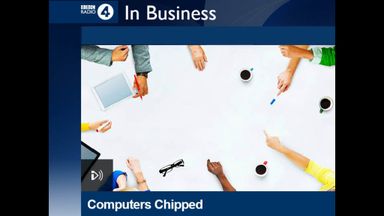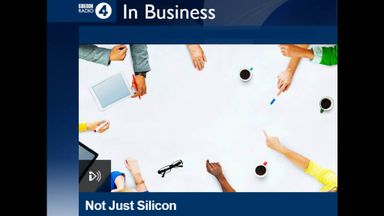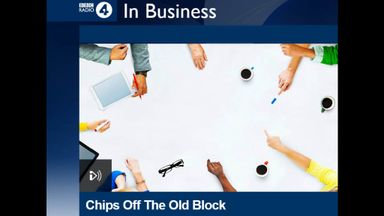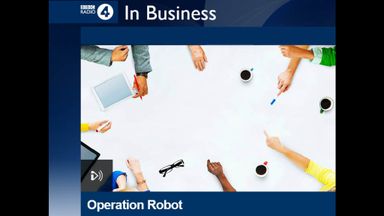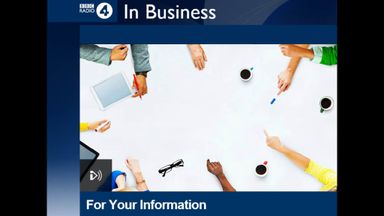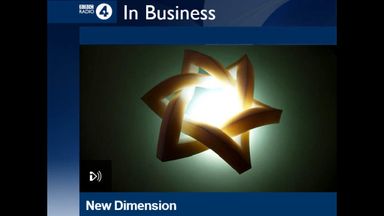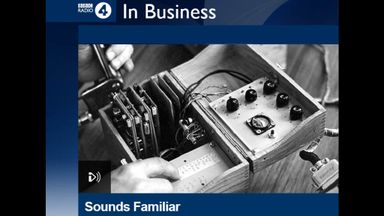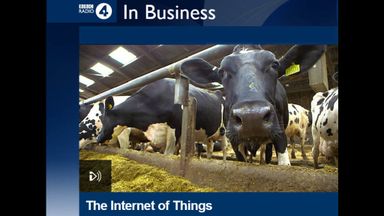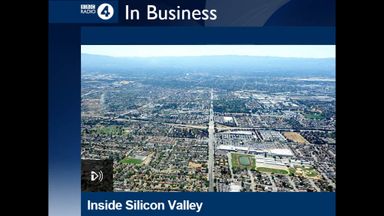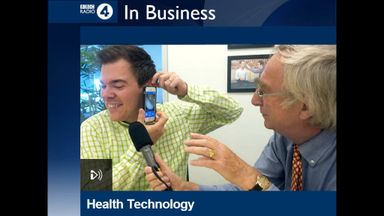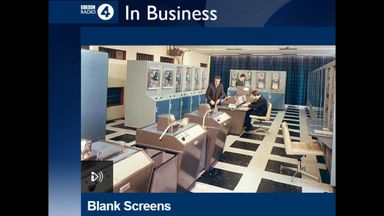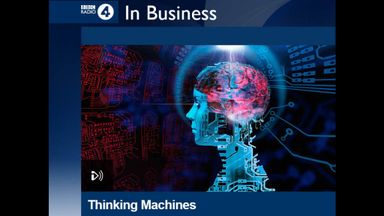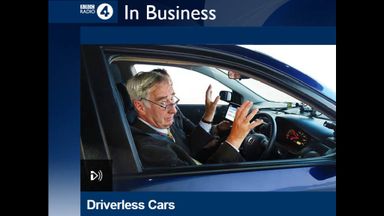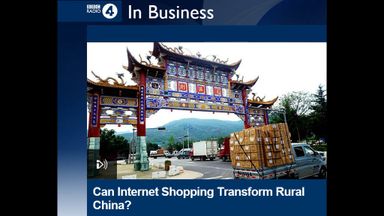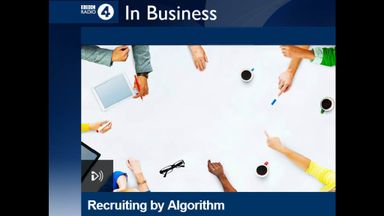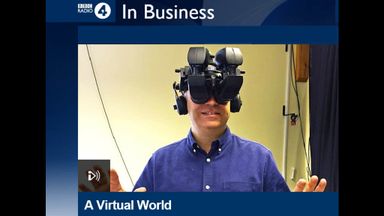In Business
Not Just Silicon
Clips from this programme
Silicon Valley California tackling recession (Paul Saffo, Futurologist/ Futurist), Clean Tech, Bio Tech, Apps, Internet (Sean Randolph, San Francisco Bay Area economic forum), Failure in the right way is the secret to success. Creative newcomers
Duration: 05:38Silicon Valley California tackling recession: PayPal- Max Levchin from Ukraine became co-founder of PayPal with Peter Thiel by chance, fighting fraud
Duration: 07:17Silicon Valley California tackling recession: Moving away from IT: Clean Tech and Green Tech, Serious Materials (Kevin Surace) (building materials' re-invention)
Duration: 07:55Silicon Valley California tackling recession: A start-up story (Nick Swinmum, co-founder Zappos.com, online shoe-shop), acquired by Amazon
Duration: 06:28In Business
Computers Chipped
First broadcast: 6th September 2007
Duration 27:54
Computers Chipped: For 40 years, computer chips have doubled in speed and power every two years. But maintaining the pace is becoming more difficult. Peter Day asks if Moore's law has set a trap for the industry at the heart of the way business works. Producer NEIL KOENIG
Bring on the Bandwidth
First broadcast: 4th September 2008
Duration 27:48
The internet needs more and more bandwidth to provide on-demand services that users want. But can the system cope? Peter Day asks the experts, including the writer George Gilder. Producer Neil Koenig
Not Just Silicon
First broadcast: 16th May 2010
Duration 27:15
Silicon Valley California is the place where for the past fifty years new enterprise has thrived more effectively than anywhere else in the world. So how is the Valley tackling recession? Peter Day hears from some brand new companies trying to reshape the future in the same old vigorous way. Producers SANDRA KANTHAL, NEIL KOENIG
Now playing
Chips off the Old Block
First broadcast: 9th September 2010
Duration 27:58
Once upon a time, British computing led the world. In a mobile world, some people think it might be happening again. From Bletchley Park to Bristol, Peter Day reports on the past, present and future of computers UK.
Operation Robot
First broadcast: 2nd December 2010
Duration 27:55
The revolution in the operating theatre is only just beginning, but robotic surgery could change the way we think about healthcare ... and the way surgeons work. Peter Day looks at what surgeons are able to achieve with robots now and at the proto-types for healthcare in the future. He asks how significant these advances could be for health in Britain and for British business and hears from the robot pioneers: surgeons, engineers and business people. Producer CAROLINE BAYLEY
For Your Information
First broadcast: 28th April 2011
Duration 28:04
Information seems to be moving right to the heart of the 21st century economy but nobody really knows what it is or how it works. Peter Day talks to pioneers in the field of information management as well as corporate gatekeepers of this valuable commodity we call information to find out what advances are being made with the amount of data we now generate.
New Dimension
First broadcast: 28th July 2011
Duration 27:48
Three-D printing may be the next revolution in manufacturing. It's being used to make things in a completely different way from the mass production we've been familiar with ever since Henry Ford introduced the production line more than 100 years ago. Ford made a succession of almost identical items and that's what mass production still does today. 3D printing --or additive manufacturing as it's also known -- means that every product can be individual. It's a completely different way of thinking about manufacturing and costs little more to customise than it does to mass produce. This could potentially revolutionise manufacturing and businesses from top to bottom. Peter Day investigates. Producer CAROLINE BAYLEY
Strike Up the Broadband
First broadcast: 13th December 2012
Duration 28:12
The government's aim is clear: by 2015, it wants Britain to have the best superfast broadband network in Europe. The internet is so essential to businesses, the argument goes, that the network over which internet traffic travels is becoming a vital part of the UK's infrastructure - as important as energy and roads. Right now, though, the country is a long way off from the target. Nowhere is this more apparent than in rural and remote areas of the country. In Norfolk, some small businesses are struggling just to get connected, much less plug into the high-speed network the government has pledged to help expand. A decade ago, internet access was a luxury for many small firms, but today it's essential. Orders are placed and received online, a website is a key marketing tool for all sorts of companies, and businesses must now file VAT returns via a website. This week on In Business, Peter Day evaluates the government's plans for broadband and finds out how close the UK is coming to a high-speed future online. Producer MIKE WENDLING
Sounds Familiar
First broadcast: 3rd January 2013
Duration 27:58
After years of promise, voice recognition is at last becoming a significant method of using computers and accessing the Internet. Why now, and what difference does it make? Peter Day talks to the companies at the forefront of developments in the field (including Massachusetts-based Nuance, one of the largest makers of voice recognition technology), and asks whether our relationship with machines will change once we have the ability to talk to them.
The Internet of Things
First broadcast: 12th September 2013
Duration 27:57
Six billion people worldwide already have mobile phones. Now the experts are talking about the coming Internet of Things: 50 billion interconnected objects, from cows to coffee machines. Peter Day asks what it means and how it may happen. Producer LAURA GRAY
Inside Silicon Valley
First broadcast: 14th August 2014
Duration 27:49
Can Silicon Valley's enormous success as the global centre of innovation continue indefinitely? With new challengers popping up all over the world - from Boston to Tel Aviv - will Silicon Valley keep ahead of the game and what seeds need to be sown now to ensure future creativity? Peter Day explores the Valley - past, present and future - with start-ups, entrepreneurs and venture capitalists. Producer RUTH ALEXANDER
Health Technology
First broadcast: 21st August 2014
Duration 27:59
Peter Day reports from Silicon Valley on the cutting-edge innovation that's promising to transform healthcare. From apps which monitor your fitness to phone attachments that diagnose ear infections, the boom in high-tech gadgets is attracting millions of pounds of venture capital money. But can the technology companies really come up with the goods which will make us live longer, healthier lives?
Thanks for the Memory
First broadcast: 4th September 2014
Duration 27:49
The internet and and the rapid rise of social networking creates the possibility of remembering forever most of life's most significant (and insignificant) moments - maybe all of them. Peter Day hears from people building businesses based on this new extension of the human mind, and asks whether total recall really is a good idea. Producer MIKE WENDLING
Blank Screens
First broadcast: 9th April 2015
Duration 27:51
The Information Technology department used to be a mysterious backroom operation, but has become the vital component of a successful company. With relentless technical developments businesses are facing a constant risk of their computer systems being past their sell by date. Peter Day explores how companies are wrestling with the increasing demands of keeping their I.T fit for purpose.
Thinking Machines
First broadcast: 7th May 2015
Duration 28:00
One of the most famous computer systems in the world is called Watson, developed by IBM. It's best known in for beating two human contestants to win the American game show, Jeopardy. Watson may now be leading a revolution in 'machine learning'. Peter Day reports from New York City, fast becoming a high tech rival of Silicon Valley, to find out how smart our machines are becoming and whether we should be worried about the impact Artificial Intelligence will have our lives. Producer SANDRA KANTHAL
Driverless Cars
First broadcast: 30th July 2015
Duration 27:54
As the race to develop driverless cars hots up around the world, the UK is determined not to be left in the slow lane. Government money is being invested to help test vehicles and 'pods' over the next three years. It's not just the robotic technology which is being developed- building the trust of the public in vehicles which eventually won't need drivers behind the wheel is crucial. There's still a long way to go, and Peter Day talks to those involved in this brave new world of transport. Producer CAROLINE BAYLEY
Can Internet Shopping Transform Rural China?
First broadcast: 26th November 2015
Duration 27:38
In some areas of rural China, traditional farming communities are transforming into something very 21st Century: internet shopping hubs. Leading the way is the village of Qing Yan Liu where, four hours south of Shanghai, local residents have created a world of bubble wrap and sticky tape. In the eyes of the Chinese Premier Xi Jinping this could be the future of rural China. He hopes that more and more small communities will copy what's happened in Qing Yan Liu - now dubbed 'China's No. 1 E-Commerce village'. It's hoped this will halt the flow of young people from rural China to the nation's cities, as they go in search of employment. Turning more small towns and villages into online shopping hubs would provide much needed jobs, and a reason for young people to stay at home, ensuring communities continue to survive rather than disappeard. Producer CHARLOTTE PRITCHARD
Recruiting by Algorithm
First broadcast: 8th May 2016
Duration 27:56
Can a computer programme choose the right applicant for a job? Online assessments, scanning programmes, computer algorithms and the number crunching of social network data are all now part of the tool kit of the recruitment industry. As Peter Day discovers, to get through to an actual interview, you often have to impress a computer algorithm first. Traditionally a subjective process, Peter looks at this huge change in the way people are selected for jobs and asks whether technology can achieve the recruiters' aim of eliminating bias from hiring. Producer CAROLINE BAYLEY
A Virtual World
First broadcast: 18th August 2016
Duration 27:45
A new technology is emerging which could change the world as significantly as mobile phones or the Internet. That technology is Virtual Reality. Up to now it's mainly been used for fun - but things are changing. Adam Shaw investigates how VR could change our lives and revolutionise the world of business. Enabling us to be in two places at once and, for example, replacing the need for many painkillers and helping cure psychological problems. Producer SMITA PATEL






